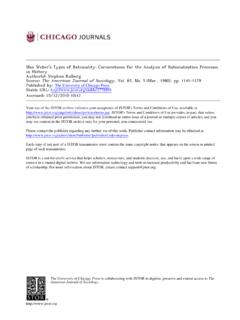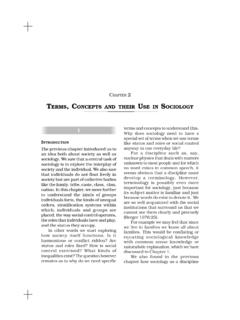Transcription of INDEX TO VOLUMES I-V - History and Theory
1 INDEX TO VOLUMES I-V. 1960-1966. ARTICLES. JOSEPH AGASSI, Towards an Historiography of Science II, BeL 2, 1-117. Bacon's inductivist philosophy of science divides thinkers into the scientific and the prejudiced, using as a standard the up-to-date science textbook. In- ductivists regard the History of science as progressing smoothly, from facts rather than from problems, to increasingly general theories, undisturbed by contending scientific schools. Conventionalists regard theories as pigeon- holes for classifying facts; History of science is the development of increas- ingly simple theories, neither true nor false. Conventionalism is useless for reconstructing and weighing conflicts between schools, and overemphasizes science's internal organic growth.
2 For Popper, not for inductivists or con- ventionalists, the successful criticism of theories is the heart of science. Popper's view admits the existence of valuable errors and enables us to avoid being wise after the event, thereby improving our understanding of the History of science through reconstructions of the actual interplay of theories and facts. OTHMAR F. ANDERLE, A Plea for Theoretical History IV, 27-56. Everywhere--even in Germany-the great specialization of historical research and its philosophical rationale, historicism or the cult of the particular, are bankrupt. A synoptic picture of the historical world is no less necessary than one of the natural world. To obtain it we must abandon the false dichotomy between nature and History ; idiographic and nomothetic methods are applicable to both.
3 Theories of History will not compromise man's free will. historical Theory might, like economic Theory , identify structural elements in human relationships as well as non- historical factors which influence them. RAYMOND ARON, Thucydide et Ie recit des evenements I, 103-128. International problems are not reducible to economic and social con- juncture. Thucydides therefore focuses on events, particular human acts performed freely chosen, and thus themselves irreducible to junctures of forces. No twentieth-century Thucydides could exist; no intelligible account of the wars of the present century could omit references to actors, but they would not be of central interpretative importance. Modern events are disindividualized, modem collective decisions numer- ous and complex.
4 Thucydides nevertheless remains significant today to 4 INDEX TO VOLUMES I-V. those unwilling to view events divorced from the action of individuals. As an historian Thucydides experienced a feeling of destiny looking back upon free actions, but still held that they alone merit attention.. SAMUEL H. BEER, Causal Explanation and Imaginative III, 6-29. Re-enactment The Hempel-Popper dictum that causal explanations require hypotheses cast in universal form encourages bad generalizations. Generalizations relative to a context are more fruitful for the social scientist (even physi- cal "laws" may be relative to such contexts as an expanding universe). Causal explanation is complementary, not opposed, to explanations by imaginative re-enactment.
5 Rational explanation, one type of imaginative re-enactment, often involves causal explanation, in showing chosen means to be appropriate for a given end; and causal explanation usually involves imaginative re-enactment in establishing the meaning that actions have for agents. LEE BENSON, Causation and the American Civil War: Two CUSHING STROUT, Appraisals I, 163-185. Benson: Certain logical principles govern explanations of human be- havior: alleged causes must actually occur before their effects; men must be aware of events that allegedly affect them; explanations must jibe with generalizations about behavior and have intrinsic plausibility. Historians often neglect these principles. The best example is analysis of public opinion.
6 Comparison of Thucydides with the historiography of the American Civil War shows both must assess public feeling on specific issues at a given time and place; but historians lack the tools to do this, and have recourse to dubious assumptions (such as that writers are the best reflection of public opinion). Sometimes even the principle of chronological priority is violated. Consistent application of the four logical principles above would at least narrow the range of potentially verifiable explanations and consequent disagreement. Strout: Specification of a "fundamental cause" of the Civil War or other events is best construed as a retrospective observation that the cited "cause" figures centrally in some reconstructed story.
7 Historians explain through stories, narrations, which aim at comprehending the dramatic "logic" of a sequence of events rather than at scientific explanation. At worst general questions of causality are an irrelevant source of in- terminable disagreement, at best a stimulus to research, potentially result- ing in a more coherent story and increased understanding. Causal accounts seem indispensable largely because explanations often involve purposes and reasons in causal disguise. PETER BERGER AND STANLEY PULLBERG, Reification and the Sociological Critique of Consciousness IV, 196-211. Society is a dialectical process: men produce society, which in turn pro- duces them. Certain Marxist categories are especially useful for the INDEX TO VOLUMES I-V 5.
8 Sociology of knowledge, dealing with the relation between consciousness and society. Social structure is nothing but the result of human enterprise. Alienation--rupture between producer and product-leads to a false conscioUSness in neglecting the productive process. Reification, historically recurrent though not anthropologically necessary, while bestowing onto- logical status on social roles and institutions only sees society as producing men. Certain social conditions encourage de-reification. Philosophy and sociology, superstructures rooted in intersubjectivity, must co-operate in pursuing the sociology of knowledge. ISAIAH BERLIN, History and Theory : The Concept of Scientific History I, 1-31.
9 History details the differences among events, whereas the sciences focus on similarities. History lacks the sciences' ideal models, whose usefulness varies inversely with the number of characteristics to which they apply. As an external observer the scientist willingly distorts the individual to make it an instance of the general, but the historian, himself an actor, renounces interest in the general in order to understand the past through the projection of his own experience upon it. It is the scientist's business to fit the facts to the Theory , the historian's responsibility to place his confidence in facts over theories. WILLIAM J. BOUWSMA, Three Types of Historiography in Post- Renaissance Italy IV, 303-314.
10 Especially after 1530, Italy was so fragmented that a national histori- ography was impossible. Florence, Rome, and Venice were the chief regional centers. In Florence, the utility of History for the statesman was increasingly denied. Historians lacked self-confidence, and the re- publican tradition faded out in the excessive empiricism of Ammirato. In Rome, the Counter-Reformation rejected the historiographical achieve- ments of the Renaissance; historians were deflected from research into rhetoric and justification of the Church replaced disinterested inquiry. Only in Venice, formerly backward, did historiography thrive, perhaps in response to Venice's declining power. Venetian historiography was enriched by theories emanating from Padua and by close contact with political reality.






